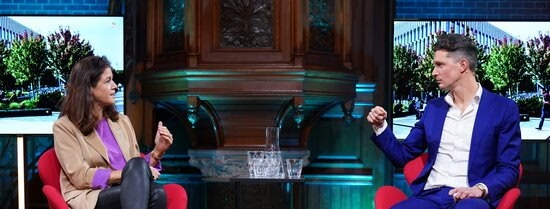Annelien Bredenoord has now been Rector Magnificus of Erasmus University Rotterdam for just over 100 days. It is time for her to join Studio Erasmus, the university's talk show. In an interview, she elaborates on her work as an ethicist, the corona crisis, and her wishes for the university of the future.
"An ethicist specialises in thinking about ethical dilemmas. An ordinary dilemma becomes an ethical dilemma when fundamental values and norms come into play," says Bredenoord. "Eating meat, for example, while knowing that animals die for it. An ethicist disentangles, so to speak, the tangle of emotions, intuitions, arguments, sensible and nonsensical information.”
A glorious moment for science
Ethical dilemmas have been a frequent topic in the past two years. Bredenoord developed a fellow 'corona ethics', to help people sort out their problems. She believes that many scientists shared their knowledge well during the corona crisis: "Science developed treatments, informed policy and developed a vaccine. Without science, we would have muddled through for seven more years and many more people would have died and become ill." What could be done better is to explain that science is also constructive knowledge and make probability judgements. But she concludes: "I really think this is the moment of glory for science."
Understanding political decision-making
Shaping the university of the future is one of the reasons Annelien Bredenoord became Rector Magnificus of Erasmus University Rotterdam. She also wanted to become rector in Rotterdam because of the impact strategy of the university. Science has an important role in feeding policy makers and politicians who have to solve the problems. The fact that Bredenoord is also a member of the Senate for D66 is, she says, an advantage: "because I know how the political decision-making process works, where does the role of the scientist stop and the role of the politician begin?”
More appreciation for other career paths
The university of the future maps out problems in society, helps to interpret them, and develops and experiments with different interventions. But not only that, it is also a place where there is more appreciation for other career paths. For example, in the field of education, leadership or impact in society. However, she emphasises that making a career in science will never be easy: "It is always an environment where people are challenged to be the best they can be."
And more money
Finally, the funding issue of universities is addressed: "I want more money", she says in response to the many temporary contracts young researchers work on. This is because the funding of universities has not kept pace with the increase in the number of students. In addition, she expresses the wish to have more instruments to control the influx of students, in the places where that is necessary because the quality of a study is at stake.

- Related content
- Related links
- Profile Prof. Annelien Bredenoord

